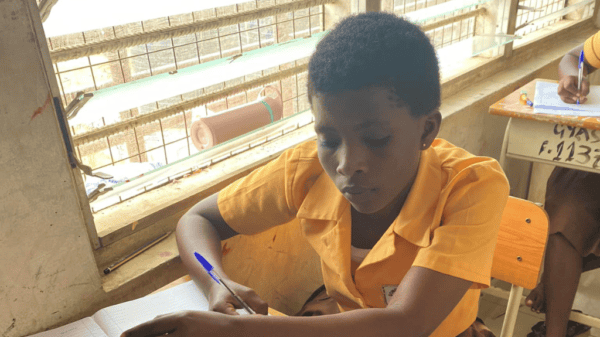Key takeaways
- The BECE grading system uses a nine-point scale, with Grade 1 being the highest and Grade 9 being the lowest.
- Your overall BECE score consists of 30% continuous assessment from your school and 70% BECE examination score.
- The new grading system requires a 90-100% score for Grade 1, compared to the old system’s 80-100%.
The Basic Education Certificate Examination (BECE) is a milestone for students in Junior High Schools in Ghana. It marks the end of your basic education and determines your admission into secondary school.
What is the BECE grading system?
The BECE grading system uses numbers as grades to assess your performance and understanding of the various subjects after your basic education.
It’s administered by the West African Examination Council (WAEC), which assigns grades using a nine-point scale, with grade 1 being the highest and grade 9 the lowest.
- Grades 1–3 show a perfect understanding of the subject.
- Grades 4–6 mean you have a reasonable and fair understanding of the subject.
- Grades 7–9 show a developing understanding of the subject; it’s not necessarily a failure.
Here’s the detailed breakdown:
| Score (percentage) | Grade | Grade interpretation |
| 90–100 | 1 | Highest |
| 80–89 | 2 | Higher |
| 70–79 | 3 | High |
| 60–69 | 4 | High Average |
| 55–59 | 5 | Average |
| 50–54 | 6 | Low Average |
| 40–49 | 7 | Low |
| 35–39 | 8 | Lower |
| 0–34 | 9 | Lowest |
Further research suggests that WAEC uses the Standard Nine (Stanine) grading system where applicable. It’s a nine-point scale that compares your performance with your colleagues.
The top 4% of candidates in a particular subject get Grade 1, the next 7% get Grade 2, and so on. This means you can score 90% in a subject and still get Grade 2 if your score is not in the top 4%.
Here’s how the stanine grading system works:
| Stanine score | Proportion of students |
| 1 | Top 4% |
| 2 | Next 7% |
| 3 | Next 12% |
| 4 | Next 17% |
| 5 | Next 20% |
| 6 | Next 17% |
| 7 | Next 12% |
| 8 | Next 7% |
| 9 | Lowest 4% |
How does the BECE grading system work?
Your BECE results determine two things:
- Admission to Senior High School (SHS).
- The category of the school you will be placed in.
To pass your BECE, you must get at least an aggregate of thirty-six (36). Your total aggregate comes from the six subjects you did best in out of all the subjects you took in the exams.
These subjects are divided into:
- Mandatory subjects: English Language, Mathematics, General Science, Social Studies, Religious and Moral Education, Career Technology, and Creative Arts and Design.
- Elective subjects: The Ghanaian Languages (based on what you studied in your school).
- Optional subjects: French, Arabic, and Computing.
To calculate your aggregate, sum your grades in the core subjects (English, Science, Social Studies, and Mathematics) and any other two subjects under the elective, mandatory, or optional category in which you performed best.
Note: Continuous assessment during junior high school also contributes to your final grades, including class tests, assignments, and end-of-term exams. It accounts for 30% of the final BECE scores.
Old vs. new BECE grading system
The BECE grading system in Ghana has changed over time. The old system used different percentage ranges and grade interpretations. To get Grade 1 in the old system, you needed a score of 80-100%. However, you need a score of 90-100% in the new system.
Also, in the old system, Grade 9 was labelled as ‘fail,’ which has now been replaced with ‘lowest’ in the new system. If you get Grade 9, it just shows you have to do better and does not mean you are a failure.
Common misconceptions
Several misconceptions about the BECE grading system have led to confusion among students and parents. Here are some common misconceptions and the truth:
- You must score an aggregate of 30 and below to gain admission. However, this is no longer true. Under the Computerised School Selection Placement System (CSSPS), you may still get admission even if your grade is 42.
- Some say the aggregate score is the sum of each subject’s raw scores (grades). But that’s not true. The aggregate score is the sum of your best six subjects (all four core subjects and two elective/optional subjects).
- Large grade numbers do not mean better performance. In the BECE grading system, lower numbers/grades mean better performance. Grade 1 is the highest, and grade 9 is the lowest.
FAQs
What is the minimum grade required to pass BECE?
The minimum grade required to pass a subject in the BECE in Ghana is grade 6. This means you must score at least 50% to pass a subject.
Can aggregate 30 get admission to any SHS?
Yes, getting an aggregate score of 30 can still get you admission into SHS, though it may not be at your preferred school.

Conclusion
The BECE grading system plays a significant role in Ghana’s educational system. It evaluates how well you understand what you’ve learned and is crucial to your next education cycle.
So, do your best in each subject to get into your preferred SHS and study your desired course. Do you have any questions or thoughts? Leave your comments or share your experiences below.











399 Comments. Leave new
Can you change the placement
If you were placed automatically, you cannot change it.
Can you do self placement without a good grade
Yes, self-placement is often available to all students who weren’t placed automatically.
If about a 40 people in a class get 90-100
Will only 4%get grade1
Sorry Ivan, your question isn’t very clear. Can you ask again?
Yes, the top 4% among them will be given the grade 1 and the rest will moved to the next comparison.
Will agg 31 get addmission
Yes, this is possible but it depends on a lot of factors like the schools you chose, the course you wanted, and status; day and boarding.
Why did WAEC cancel many candidatez BECE?
Most of the results that were cancelled were as a result of examination malpractices.
Hello ma’am, what date will the school come?
Hello Bella, we’re unsure but the official placement process will start on September 17, 2025, where you will confirm your school choices before the final placement results are released.
Hi, auntie do u also make the BECE
No, Ifeanyi. I do not. 🙂
Please my son got aggregate 33 can He still get Queen of peace SHS or Kanton SHS With general arts course
With aggregate 33, it may be tough, but it’s not unlikely and would depend on the competition for places in those schools this year.
Hello, am when will we go to school.
We are currently unsure of this, Maya. But the GES academic calendar says you’ll go to school on 18th October, 2025.
Can you get C school with aggregate 35 if you want to do General science
With aggregate 35, it may be very hard to get General Science, even in a Category C school. General Science is one of the most competitive courses.
Will aggregate 30 get a chance to get a school when the person is going to do General science
Aggregate 30 is high for General Science, so it will be very hard to get a school with that course. But you can look at other less competitive courses to still get placement.
Pls, can i get ghana national with 23 to study business
Aggregate 23 makes it very difficult to get Ghana National, especially for Business. You’ll need to look at less competitive schools for a better chance.
Please let me understand this. If let’s say, 20% of the candidates score 100% how will the top 4% be determined?
Great question, Samuel!
The thing is WAEC doesn’t explain exactly how they handle grading behind the scenes. Sometimes they use the stanine system to rank students, and other times they may apply the standard grading system, even within different subjects.
That’s why we included both explanations in our article.
Whatever the case, if many students score the same high mark, WAEC will find a way to separate them into different grades. But we don’t have a complete understanding of how they do it every single time. 🙂
I am 2025 candidate and I will like to ask if may get a boarding school with grade 29
Hi Patrick, with grade 29 it may hard to get a boarding school. Most boarding schools, especially popular ones, take students with much lower aggregates.
Please I had agg. 12, i chose Wesley Girls High School as my first choice with Science as the course. I’m hearing this year the results aren’t that good so does it mean I have a fair chance of getting the school??. Thank you.
Hi Ayeyi, with aggregate 12 it may prove difficult. Wesley Girls is very competitive, even in a year where results are reportedly not good, and especially for Science. There’s a chance but you must also be ready to go with your other choices.
Will I get St. Peter’s shs with 15 offering or with Agriculture?
Hi Prince, with aggregate 15 you do stand a chance. Still, keep in mind that St. Peter’s is one of the very competitive schools, so anything can happen.
Pls 14 is good to get st hubert as general science
Yes, aggregate 14 is good. You may be able to get St. Hubert for General Science, though it will also depend on competition and available slots.
Will my daughter get a category B school with grade 23 , course general arts
Hello Adjoa, with grade 23 it can be tough for a Category B school, especially with a competitive course like General Arts. It’s not impossible, but the chances are small.
When you get 22 of the 4 zubject and any 2 doez it mean it iz not the final gwade on the cetificate?
The 22 you got is your provisional result, and WAEC will confirm it on your final certificate.
But please avoid writing with slang or short forms like this, it can confuse people and also affect how seriously your message is taken. Always try to write clearly.
When u get 30 in the BECE doez it mean u have fail?
Getting aggregate 30 doesn’t mean you have failed, but it’s on the higher side, so you may not get a top school. You can still be placed in another SHS.
I had aggregate 14 and I want to study general science, will i get a chance to school at legon Presec or Ghana National College
Aggregate 14 is good, but getting General Science at Presec or Ghana National will be very tough. The competition is high, so the chance is very small.
Hello ma’am, please my daughter had 12 and I want to know if she can get her first choice Ofori panyin snr hg with general art ? And can the course be changed ?
Yes, with aggregate 12, your daughter has a fair chance of getting Ofori Panyin for General Arts, though it’s not guaranteed since placement also depends on the level of competition this year.
About changing the course, once placement is out, it’s not easy to switch, so it’s best to stick with the chosen programme.
Can I get a category B with the program general science, while I got grade 4 in science
With grade 4 in Science, getting General Science in a category B school may be possible, but it will also highly depends on your total aggregate and competition this year.
Can a kid get Mfantsipim with grade 17
With grade 17 it will be very tough to get Mfantsipim, since it’s one of the top schools and usually requires lower aggregates. However, depending on the course you chose, there may be availability.
Can you get an aggregate 19 and get category B school
Yes, with aggregate 19 you can still get a Category B school, though it may depend on the specific school and programme you choose.
I got aggregate 22 so is it likely for me to get sogakope senior high school
With aggregate 22, it may be a bit tough to get Sogakope SHS, but there’s still a chance depending on the programme you choose and how competitive admissions are this year.
Can aggregate 35 get school
Aggregate 35 is high, so it’s not easy to get placed directly. You’ll most likely have to use the self-placement system to choose from the schools that still have space. 🙂
Pls i got grade 28 will i get school?
Yes, Clifford. You’ll still get a school with aggregate 28. It may not be one of the most competitive ones, but you’ll most likely be placed.
Please is aggregate 18 okay to enter abomosu stem school ?
Xorla, yes aggregate 18 gives you a fair chance at Abomosu STEM. The school is competitive, but with that grade you can still be considered.
Please will 7’s get admission into her first choice
An aggregate of 7 is excellent, Kobby. Very well done. With that grade, getting admission into the first choice is very likely.
Which 7,aggregate 7 or plenty 7’s
Can grade 33 school
Aggregate 33 is very low, so you may or may not get placed automatically. But don’t worry, you can still do self-placement to find a school.
Which category of school will u get when u get 27
With aggregate 27, you’ll most likely get a Category C or D school. Getting Category A or B will be very difficult.
Pls wat will u get before u get ur B schools
To get a Category B school, you usually need an aggregate between 6 and 20. But it also depends on the course you choose as some courses like General Science or Business are difficult to get.
Please if my grades are not to my satisfaction can I request for a special review or remark of papers and how
Yes, you can request for your BECE papers to be re-marked if you’re not satisfied with your grades.
Who is confused: the system or the operators of the system…
You say 90-100 is 1. Then you say someone can score 90 and get grade 2 because he might not be in the top 4%.
Na who you dey try confuse?
We know, Samuel. The 90–100 = Grade 1 is how a criterion-based system works and the top 4% example is how the stanine system works. Those are two grading systems that aren’t used at the same time. We’ve provided both grading systems since we’re unsure which one WAEC uses.
Pls why has the grading system changed.it is making it difficult for students to pass. get 90%requires a lot of effort.maybe effort put in place can’t match.
That’s true, Elvis. 90 does look high, but that’s how WAEC sets the range. It rewards only the very top marks with grade 1, while lower ranges also get their grades.
Is 23 a chance for u to get an A school
Aggregate 23 makes it difficult to get a Category A school, but it really depends on the course you chose.
My daughter had all 1’s in all the subject except for science, she had 9. I learnt one will not get a school when they get grade 9 in their results despite their pass in other subjects. Is it likely for my ward to get a school with grade 9 in science?
Hm, having all 1’s is really excellent, but a grade 9 in Science will make placement for Science-related courses difficult.
Will you get one of the best schools if you get aggregate 15?
Aggregate 15 is a fair grade, and you can still get a good school with it. Whether it will be one of the top schools depends on the course you chose and how competitive that school is.
please if someone gets aggregate ten, will she get her first choice school? what if its wesley girls senior high school?
Aggregate 10 is a strong grade, so there’s a chance of getting the first choice. But for a school like Wesley Girls, it will also depend on the course you chose.
Can my son get a Category A or B school with aggregate 33 to do visual arts?
With aggregate 33, it may not be easy to get a Category A or B school, but Visual Arts gives a better chance. Even if the first choices don’t work, there’s still opportunity through self-placement to get a good school and continue with the course.
Hi please can grade 37 get me an SHS
Grade 37 is quite high, so getting admission into SHS will be very difficult. We’d recommend trying through self-placement when the portal opens.
Please can aggregate 38 get admition to SHS
Aggregate 38 is quite high, so getting admission into SHS will be tough. But you can still try through self-placement when the system opens.
Is 22 good
Yes, Peace. While it’s not top-tier like 6–12, it falls within the range that can still get you into a decent school, depending on the competition and school choice.
I was the class best student and wrote correct answers which was confirmed by the internet after every paper but my results was shocking and bad
We’re really sorry you feel this way, Kingsley. Sometimes results don’t turn out the way we expect, even when we do our best. If you strongly believe there was a mistake, you should speak to your teachers about it.
Can there be changes after waec finilize the results
Hi Kingsley, once WAEC finalizes and confirms the results, they normally don’t change again. The only exception is if a candidate requests for remarking within the given time, or if WAEC itself finds an error. Otherwise, the results remain the same.
Is grade 27 good for real amass
Hello Ayisha, aggregate 27 is on the high side, but you could still get Real Amass if there are enough spaces for the course you chose. If not, you’ll still be placed in another good school.
Can u do science with that grade
With an aggregate of 22, it will be hard to get General Science in most top schools since it’s one of the toughest courses to enter. But you can still get other good courses with that grade.
Why is this that the bece results releasing date is not stable
Because most people didn’t know the exact date and were just guessing. 🙂
Mmm
When is the BECE results expected to be released
The 2025 BECE results have been released.
Please is aggregate 32 bad
Aggregate 32 isn’t the best, but it’s not the worst either. You may need to use self-placement for SHS, but you can still get a school.
Please, Graffiti is under which course?
Sorry John, we are unsure what you mean.
Madame please this year which grading system was used
Hello Brobbey, WAEC has not officially confirmed the grading system for this year, but it’s likely they will use the Stanine system.
Please can you throw more light on the stanine grading system
Sure, Okyere. The stanine system is a way of grading where students are grouped into 9 bands. Instead of using raw scores only, a fixed percentage of students fall into each grade (e.g., top 4% get Grade 1, bottom 4% get Grade 9). That’s why it’s called stanine (standard nine). Is this clearer?
Please, I heard a rumor that this year’s aggregate system is different from the previous one. I heard that if you want to add up your grades, you just have to add mathematics and science and the rest core subjects are optional as to which one you do better in. Can you clear my doubts please?
That’s just a rumor, Samuel. The BECE grading and aggregate system hasn’t changed. WAEC still uses the same method; all the core subjects (English, Maths, Science, Social Studies) plus your best electives are considered when calculating your aggregate.
IS GRADE 19 A GOOD GRADE?
Yes, grade 19 is okay. It’s not top level, but you can get a school depending on your course and the choices you made.
Please when you score the bece 30% and continuous assesment 30%,what will be your full mark.
Sam, since you already have the full 30% from continuous assessment, we add that to your exam score (30% of the 70% exam), which is 21%. That gives a total of 51%.
Why is that this year most government schools performed Much better than private do the government give them other bonuses
There’s no official report that says government schools performed better than private ones. WAEC doesn’t release school-by-school results, so it’s hard to make that comparison.
Do they add the 30% if it is not up to 30%
Yes Sam, they add the exact CA score you obtained, even if it’s less than 30%. It is then combined with your exam score to get the final mark.
30% for each subjects?
Hi Sam, yes; the 30% is for Continuous Assessment in each subject. It is added to the 70% from the final exam to get your total score for that subject.
Hope that helps. 🙂
So please madam let sey i score 80% and the continuous assessment is 22% which grade will you get?
Hello Osei, if your continuous assessment is 22% and you score 80% in the BECE exam, then you’ll get 56% from the exam plus your 22% CA, making 78% in total. That puts you in Grade 3, using the standard grading system. 🙂
If I get 15 to 20 which choice of school can I have
With an aggregate between 15 and 20, you can get a good Category B or C school, depending on the programme you choose and the spaces available.
Please, I passed all the core subjects( B3, B2, C4, C6) during the WASSCE and had the lowest in two of my electives, although I had B2 and C4 in Government and Geography respectively. Thus, French and Economics, in which I had the lowest outcome. Can I go further into the tertiary??
Hello Ben, you can go to the university with those results. Most schools consider your best six subjects, including the core ones.
To be sure which schools and programmes you’re eligible for, try using mypathway.app. It’s free and will help you check your options easily.
Wishing you all the best.
Thank you, but please if the result release how many months or days does the school replacement also come
After the BECE results are released, it usually takes a few weeks for the school placement to be out. WAEC and the GES will announce it officially when it’s ready.
Please can grade 34 get an admission to shs
Grade 34 is very low, so it’s likely you won’t get automatic placement. But you can still do self-placement to find a school with available spaces.
Please madam any news for Bece 2025 release date
Hello Abigail, the BECE 2025 results are expected to be released between late July and early August, based on previous years’ timelines.
Hello my love
Hello Nickey. 🙂
Please madam can help me to pass my social studies in the BECE
Hello Apraku, are you preparing for the Private or School exam?
School exams
That is for next year, 2026?
Please madam when you fail one core subject like social studies but you get a grade 23 in the best six can you get school
If you fail a core subject like Social Studies but still get an aggregate of 23 in your best six subjects, getting placed in a school may be difficult.
Some competitive schools reject candidates who fail a core subject, even if the total aggregate is acceptable. It’s always best to aim for passes in all four core subjects to improve your chances.
So please can you get school
Yes, but it may prove difficult.
Please i don’t andarsand it will
Where do you find the most challenge?
Please the continuous assessment highest is30% and the loowest can it get 25%
The 30% for continuous assessment is not fixed between 25% and 30%. It actually depends on your performance in school-based assessments during JHS.
That includes tests, assignments, projects, and other activities. The better you perform, the closer you get to the full 30%.
Was it by force to every headmaster to give to give their students 30%continuous assessment or 25% or what is low percentage is what
Each school is required to submit the continuous assessment (CA) scores to WAEC, and it’s out of 30%. The CA includes class tests, assignments, and end-of-term exams.
Headteachers don’t just assign the full 30%. It depends on the student’s performance throughout JHS.
Please can you show me how to calculate an overall mark in science
Hi Freda, to calculate your overall mark in Science (or any BECE subject), use this formula:
(Exam score × 70%) + (Continuous Assessment score out of 30)For example, if you scored 60% in the BECE exam and got 25/30 in your school assessment: (60 × 0.7) + 25 = 42 + 25 = 67%.
That would likely give you a Grade 4 in the BECE grading system.
Please when you fail one core subject like social studies in the BECE but or of six subjects you get a grade 23 can you be able to get shs
Hello Obaapa, getting a grade 23 in BECE means your total for your best six subjects is 23. You can get placement into SHS, depending on the school and the competition.
However, failing a core subject like Social Studies (getting Grade 9) may affect your chances for competitive schools or some programs.
Please the external exams bece and you score 30%and the continuous assessment was 30%which grade will you be able to get
Hi Aboagye, since the exam is 70% and the continuous assessment is already out of 30, your final score would be: (30% of 70) + 30 = 21 + 30 = 51%.
A final score of 51% would likely fall under Grade 6 in the BECE grading system.
Please reduce the numbers
If you get aggregate 9 in any of the core subjects will you be able to get your school
If you mean grade 9 in one core subject, that’ll be very difficult to get admission.
Please the grade is 90 to 1001 so please if the whole Ghana the highest score was 80%, how will they do it and what will be the least grade
Hello Sammy, there’s also the stanine grading system, which doesn’t use the marks you get in the exam but shares the grade based on clearly defined percentages. We explained this in our guide.
Please teach me how to calculate bece exams example science you score 30%and the continuous assessment which grade will you be able to get
Hello Osei, to calculate your final BECE score, use this:
Final Score = (BECE exam score × 70%) + Continuous Assessment score (out of 30)So, for example, if you scored 70% in the BECE and 25 in your Continuous Assessment, then:
(70 × 0.70) + 25 = 49 + 25 = 74, which is Grade 3.
I think that when you score 30 you will not fail because when the continuous assessment adding you be pass
Yes, that’s correct to some extent, but it depends on your continuous assessment (CA) score. If your CA is strong, it can help boost your final grade.
However, if both your exam and CA scores are low, you may still not pass. So, it’s important to aim for good marks in the BECE.
Please my work is construction work please which grade will I remove before I will get construction work and the best school that I must get
Sorry, we do not understand your question. Can you ask again?
My daughter had aggregate 16, can she get Armed Force SHS
It’s possible, but Armed Force SHS is a competitive school. So, this would depend on factors like the course she chose and whether she opted for day or boarding.
Which cores must you choose to pursue STEM cores
Hello Akoto, your question isn’t very clear. Can you come again?
Can u get your second choice if u get grade 20 with a chore general art
This may be difficult because most second choice (category B) schools are very competitive.
I got aggregate 16 and wanted to do science is it possible to get my first choice
Hello Janice, the placements have been released, have you checked?
When you are a student who usually does not come to school every day or some times will they remove it from your 30% school assignment.
No, the 30% assessment is not based on attendance, but rather on quizzes, assignments, and exams. So, it’s important not to miss any of those.
Please is there a cut off point.
Because I’ve heard that there is a new cut off point which is 30.
Hello David, do you mean a cut-off point for SHS admission?
What about if I get grade 24 to 31, can I get technical college
Hello Miracle, it’s possible, but please aim higher. 🙂
Please when i score one of the core subject 30% and the continuous assessment was 30% which grade i will get
Hi Anthony, since the exam is 70% and the continuous assessment is already out of 30, your final score would be: (30% of 70) + 30 = 21 + 30 = 51%.
A final score of 51% would likely fall under Grade 6 in the BECE grading system.
Please the BECE and you score 24%in the external exams and your school continous assisment is 30%which grade will you be able to get
Your final score would be calculated like this: (24% of 70) + 30 = 16.8 + 30 = 46.8%
A final score of 47% would likely fall under Grade 7 in the BECE grading system.
Please work did you do plz
I’m a teacher, Baah. 🙂
So you have pass
Yes, grade 6 is a pass. But it’s not a good grade if you want to get admission to top schools. 🙂
What aggregate do you need to attend Achimota using the new grading system
There are many factors to consider but we’d recommend working towards a good grade, below 10, to improve your chances.
Can someone be admitted to Wesley Girls Senior High with an aggregate from 6-13 and a raw score above300
Yes, you have a chance. But it depends on the course you choose.
When you get aggregate 18, can you get a A school
It’s not impossible, Vivian. But it depends on several factors. Category A schools are highly competitive, so gaining admission with an aggregate of 18 may be challenging.
I strongly believe that students from the public schools are cheated in the bece and also the stanine grading system is not helping my public school learners.
Please what is the least aggregate one needs to acquire in the 2025 BECE to get an admission to Adisadel Collage
Adisadel College has significant competition, we’d recommend working towards an aggregate below 10 to boost your chances.
What if one gets an aggregate of 10-19?
Will that person get an admission? And also, will it favor the person if he attended a armed forces school?
Depending on the programme you intend to study, grade 10-19 may get you admission at Adisadel. However, we don’t think armed forces schools have an advantage over other schools.
Still, we’d recommend aiming for a higher grade, Felix. 🙂
I want you to make me pass
Can. I get category b shs with grade 18-28
This is not impossible but it’ll depend on many other factors like the course you choose, whether you’re a day student or boarder, and competition for admission.
What will be the last grade you will get before going SHS.
Hello Mawunyefia, your question isn’t very clear.
please what is this years grading system
The grading system hasn’t changed for this year.
The Stanine grading system has its limitations. By focusing solely on grading, we overlook the diverse contexts of students and schools being compared. This approach can be unfair, as it fails to account for the varying resources and conditions found in different educational settings.
For instance, international schools, premium private schools, and well-established government-assisted and mission schools often have more resources and better infrastructure compared to deprived schools in rural areas. The latter may struggle with inadequate teaching staff, insufficient classrooms, and limited access to educational materials.
In contrast, the traditional grading system provided a more nuanced assessment, where students could still achieve respectable grades (6, 7, or 8) with scores between 40-49%. This was particularly helpful for students who lacked qualified teachers in specific subjects.
The current Stanine system can lead to discouragement and poor performance, as students from under-resourced schools may feel their efforts are not recognized. I believe it’s essential to reassess this system and consider the unique challenges faced by schools in different regions.
Rather than assuming all schools are on an equal footing, we should acknowledge the disparities in educational resources and opportunities. In my opinion, revisiting the traditional grading system could provide a more accurate and fair assessment of student performance. This approach would allow for a more comprehensive evaluation of students’ abilities, taking into account the varying contexts in which they learn.
This is so well put Williams, we agree with a lot of the points shared.
If you ever want to dive deep into this critique, we’d be happy to have your submission published under our Opinion section. 🙂
I will be very much happy. ☺️
What type of grade will you have for school replacement
Sorry, can you say again? Your question isn’t clear.
What is the past grade for 2025 BECE
The minimum grade required to pass a subject in the BECE in Ghana is grade 6. This means you must score at least 50% to pass a subject.
However, we recommend aiming higher to increase your chances of getting placement for SHS/SHTS.
Please am now about to write my BECE and I heard the grading system has changed from 95-100 grade 1 and I want to verify that’s all
Hello Vanessa, that’s not true. The BECE grading system has not changed.
Really? So this year they won’t use the stanine grading system?
We’re unsure which of the grading systems WAEC would use. However, the claim that 95 to 100 % is now grade 1 is not true.
Please let’s not compare this kids performance to their peers in terms of grading them because our structure of educational system is not Same in the country. A child who was taught in area where teachers are lacking , textbooks aren’t there no electricity and other related matters sit and write exam score 90 yet get grade 2. are we fair to this children ?
You’re right, not every student gets the same support like good teachers or enough books, and that really makes a difference.
But WAEC uses the same grading system for everyone, which can feel unfair. People have been asking for changes, but so far WAEC and GES haven’t said much about it.
Please i graduated BECE 2018 and I got a school but I couldn’t go, but for now I want to go to the SHS please any help???
This would be difficult given that SHS placement is computerised. We’d recommend speaking to your JHS school teachers about this.
How much is 20% in grades
20% is grade 9.
Please I had 44 in the BECE please can get any school
Aggregate 44 is very high, so you likely won’t get automatic placement. But you can still try self-placement when the School Placements are released to see if there are schools with spaces available.
Pls can u get chaiso D/A junior high school beccce code for me at nkwanta municipal in oti region
Sorry Dawuda, we cannot help with this. Please reach out to the school administration.
Can anyone help me with bece questions
Please can you help us to get selected topics for 2025 b.e.c.e so that we that we are not quick in learning can also learn we beg?
Hi, we do not have the selected topics for the 2025 BECE.
Hi my son had 18 but was placed at a school that very far and I will love to change the school, can it possible??? And if yes the process to go through please
It’s impossible to change your school placement unless you did a self-placement. We recommend speaking to the authorities in his placed school to see if they’ll consider him as a boarder.
Pls someone in the private school got aggregate 20 but he had to do self placement but another person in the government school got aggregate 24 and got his third choice
A lot of factors come into play, especially if they did not choose the same schools, course, or accommodation status.
Besides this, MoE seems to prioritise placement for students in public schools. An example is the 30% quota in Category A Schools reserved for candidates from public schools.
What will be the raw score of someone who had English 1,Maths 2,Social Studies 2 and Science 3?
Unfortunately we can’t tell the your raw score without knowing the actual marks for each subject. Raw scores are determined by the exact scores you had in each subject. For example, if you scored 90 in English, 80 in Maths, 80 in Social Studies, and 70 in Science, your total raw score would be: 90 + 80 + 80 + 70 = 320.
Pls my child got aggregate 10 and didn’t get his first choice school
Following the FSHS Policy, competition for spots in Senior High School has increased significantly, especially for popular programs like Science, Business, and General Arts. We’re sorry your child could not secure their first choice.
Can you get an aggregate 19 and get an A school
Hey, this depends on many other factors. You can check your BECE school placement to find out.
Can someone get grade 27 without not getting a school
Yes, sometimes this happens when there’s very high competition for the selected courses and schools.
What choice is an individual likely to get with aggregate 27
It depends on a lot. You can check your BECE School Placement.
please is it possible that a student will get 24 and be placed in a grade B school
Yes, there’s a possibility. Follow our guide to check your BECE school placement.
please my son had grade 24 which category and can he get his second or third choice
A lot of factors come into play besides his final grade. Follow our guide to check his BECE school placement.
Please is the can I do self placement now
If you were not placed in any of your chosen schools, you can do a self-placement.
What is the least grade required to get achimota shs
This depends on a lot of factors, like if you’re applying as a day/boarding student, what course you choose, and competition for that course that year.
We’d recommend working hard to get good grades to improve your chances.
Please my child didn’t get school can you help me do self placement for her
Please follow the steps in our guide here: How to check your BECE school placement?
Please I got 28but I didn’t get school but my friend get 29 and she got her second choice. Can you explain it why I didn’t get school
There are a lot of factors that decide school placement:
– Your total raw score
– Your chosen program
– Your type of accommodation
– The performance of other candidates who chose the same school and program
Please can get your whatsapp number
Please send us an email and we’ll respond to you privately.
Has the school placement been released
Yes, the 2024 BECE School Placement has been released. Here’s how to check your BECE school placement.
Pls can you change from 1 course to the other when you get to SHS , for instance G.Arts to G.science in the tops schools
This is often not possible but we recommend speaking to the teachers/headperson in the school you got.
Please if you get aggregated one which of your school choice will you get
Sorry, Akane, your question isn’t very clear. Can you ask again?
Can someone with aggregate 25 get an A school with business course
That’s unlikely given the increased competition.
When will the shs 1 go to school
We’re waiting on GES for the academic calendar.
Please when selecting schools, when students select bording when selecting their preferred schools after the replacement are in can a student change bording to a Day student??
You’ll have to speak to the school authorities after admission.
Please they are saying waec have changed the grading system to four scale which means grade 1 to 3 will be 1 and 4 to 6 will be 2 is it true
No, this is not true.
Pls i had aggregate 15,will i get category b school
Yes, there’s a chance. But it might be difficult given the increasing competition.
Can you go to shs offering Vis.Art with grade 31
Yes, there’s a chance. But it depends on many other things.
Pls which must you one get to get his or her 5th choice of school
Unfortunately, we do not have a straightforward answer to this.
Can you get your fith or sixth choice with grade 33 pls when will the school be coming
We’re unsure when the school placement would be released. For your choice of school, that would depend on many other things.
Please what aggregate and raw score are you expected to get before offering general science in presec legon
PRESEC, Legon has a very competitive admission process. You’d most likely need an 06 aggregate score to offer General Science in the school.
please is it true that the grading has been changed to points?
Not sure we understand what you mean by points.
Pls can aggregate 10 give you your first choice school
Yes, there’s a chance, depending on the competition for the course in your first choice school.
Pls I had aggregate 20 can I have placement in shs
Yes, you have a chance.
can someone with aggregate 27 get a school
Yes, that’s possible.
In the air, grades 1-3 = 1; grades 4-6 = 2; grades 7 – 9 = 3 …..
How true is this.
This is not true. We’ve not see any information from WAEC/GES regarding this.
My second quest was not answered ,if a candidate from govt school got 29 aggregate ,can that get B school to be offered G science
There’s lots of competition for SHS because of FSHS. So, while it’s not impossible, it can be difficult.
When a candidate get grde 25 from public school he or she has 30% continuous assessment and 30% quota from government,so what is his or her chance of getting category A,B,C or D school
There are other factors that come into play, so we’ll have to wait and see.
Pls can checking the results three times give different aggregate.Again l got aggregate 29 l want to do science can l get b school?
No, checking the results multiple times would not change it. Here are some instances when provisional results may change, but it doesn’t happen often.
I have check my result but it seems the result information is not complete.and there is no total grade on the result.
‘what is the reason?’
We don’t even know the grading system for 2024 bece result.
‘Can someone give me an explanation?’
Sorry, what’s the question?
If a kid gets 38 is there hope for that kid
There is, just not much.
I earnt the grading has changed where 1 to 3 is still 1. Is it true please?
We’ve not seen any reports suggesting this.
You write and i qout
Your overall BECE score is made up of 30% continuous assessment from your school and 70% BECE examination score.
My question is that did they use continuous assessment?
The continuous assessment comes from the students performance in school, i.e., class tests, exercises, and term exams. Schools are required to submit each students continuous assessment report prior to the exam.
Please which grading system are they using for the 2024 BECE
Between the two, we unsure which one WAEC is using for the 2024 BECE exam.
My son had 8 using the old grading isit possible for him to get mfantsipim school? Also i learnt the grading has changed where 1 to 3 is still 1
We’ve seen no reports on the changing grading system. However, 8 is a good grade so there’s a chance.
My daughter got 12 can she get a school?
Yes, it’s likely she’d get a school.
On the GES website they are still insisting that parents should use the old grading system. That’s the 4 core subjects and two best from your electives. Please which one should we go for.
We’ll verify this one last time and provide an update.
For the 2021/2022 BECE School Placement, GES had the old system for calculating your aggregate score. This, however, has changed since then for the last two academic years.
There hasn’t been any update on which format GES is using for the 2024/2025 school placement. However, we are assuming continuity from the year before.
Pls ma so can i choose english,maths and social studies as my core subject
Yes, if they’re your best three subjects.
Please can you get a school when you did a mistake on your index number during the school selection form.
Have you spoken to your teachers about this?
Please I had 14 can I offer science if I had 4 in maths
It’s not impossible, you’d have to wait and see.
Yes
Please can grade 28 get school.
It’s not impossible.
Can grade 32 or 34 get a good school or get a school
It’s not impossible, but it can be difficult.
Please my daughter get o9 but her social is 4 can she get her first choice as science student
09 is a very good grade and there’s a chance she can get her first choice.
Can grade 29 get school
Yes, it’s not impossible.
Pls the information on the results state that, the results is provisional. If i may ask ,can changes be made to those results
Yes, provisional results are subject to changes. But very often, they stay the same.
Please what aggregate will give you your first choice school according to the stanine grading system
We’re unsure which of the two grading system WAEC is using for the 2024 BECE results.
Please I get grade 28 is it easy for me to get school
It’s not impossible.
Please when someone got grade 45 in the BECE can he or she get school
This will prove very difficult, Diricck.
Please can grade 28 get school. And which category of school will I get.
There’s not a straightforward answer to this as it depends on a lot of factors; availability in choice of school, program of choice, proximity to school in some cases, etc.
My daughter’s results shows Pending on Creative Art&Design
Yes, results for Creative Art & Design haven’t been released, pending final cross-checking.
Please when checking the BECE results are we choosing our best 6 or 4 core and 2 electives
To calculate your BECE aggregate score, you must choose the best three core and elective subjects. Use our BECE aggregate score calculator.
The results are in
When are we going to check our bece results
You’ll be able to check your results when they are released.
Please will the result be released on the 16th of October?
We’re unsure of this.
When is WAEC completing the results for C.A&Design? My daughter’s results shows pending for that subject
According to WAEC,
Very often these are resolved in a few days.
Please we where told the results will be released on 14th October 2024 but yet still it has not been released, why?
It’s likely a miscommunication as GES has no set date for the 2024 BECE results yet.
Ei, this will be hard for the 2024 BECE candidate including me to get an aggregate of 6-9. Please, something must be done to change this grades. Please, update me on the grading system if there is any changes.
The grading system is too hard to gain
Please can you make the grading system for 2024 BECE that 80%-100% will be grade one because they are the first badge to write this new syllabus.
The BECE grading system is set by WAEC and isn’t often subject to changes.
When would BECE 2024 results release
Here’s everything we know.
Has the 2024 BECE scripts been marked
The latest news suggest that the 2024 BECE exams are still being marked.
Has the 2024 BECE scripts been marked?? When is the 2024 BECE results coming.
Here’s everything we know so far.
Please when u get grade 23 does it fall under aggregate B
Sorry, can you ask again? We don’t understand.
Is waec using the 4 point scale based on the new curriculum
No, WAEC/GES isn’t using a 4-point grading system.
I want to know exact grading system used in 2024
Do you mean between the two grading systems? WAEC decides which to use.
Yes
Please what does a pending paper mean?
Is that on your results?
My daughter has pending for C.A.&Design too
Please can you explain more about the standard nine (stanine) grading system?
I didn’t get it clear
The stanine grading system uses fractions (percentages) to determine your grades.
For example, if 100 people wrote the BECE exam, the top 4 scores would get Grade 1, the next 7 people would get Grade 2, and so on.
The grades are given based on how well you do compared to everyone else and not a specific range like 90-100=Grade 1.
Pls when will the results of 2024 bece be released
We wrote about everything we know in this article: When will the BECE results be out?
Please, can the grading system go down??
The BECE grading system is approved by WAEC and is not expected to change or go down. If any changes do happen, we’ll update this post.
Please of u get aggregate 19 and 20 can u get an A school
Grade A schools have very competitive admission process, so this can be difficult.
Pls if someone get grade 35 will he or she gets 4 or 5 choice
It may be difficult but it depends on a lot of other things.
Please can someone get grade 7 in science and do general science in SHS
Also can you based on a name and give a person School maybe he or she is a Muslim and he or she selected Islamic SHS which is more than Two
Yes, there’s a small chance you can do General Science in SHS even with grade 7 in Science. This depends on how well you do in the other core/elective subjects and the availability/admission requirements of the SHS you choose.
For school placements, the CSSPS will place you in a school based on your BECE scores and the spaces available in your chosen schools. We don’t know if it takes your name into account.
Can aggregate 40 and above still get admission to shs
Hm, this is possible but it’ll or can be difficult.
What about those subjects that are pending
They should be released soon.
Please my child’s french is still pending whats the problem
It would be released in due time. WAEC says it’s doing final checks on all thepending results.
Please kindly direct us where to find and download past questions for my daughter
Thanks 🙏
You can search the subject you want and add PDF to it to find downloadable past questions online.
Please if the highest mark in the whole Ghana is 70% in a subject ,how will the grading system be
The highest score you can get in a BECE subject is 100%. But this is only 70% of your total grade. The other 30% comes from your classwork and tests in school. Do you want us to provide an example?
Hi I got grade 17 in BECE would I still get Accra High School in Accra with computer Science
Please I need the code to check my daughter bece result
Hi Nickey, the BECE 2025 results have not been released yet. Once they are out, you’ll be able to get the results checker code from approved vendors or online platforms such as http://www.waecgh.org.